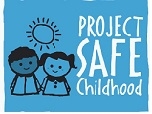Project Safe Childhood

Guided by the leadership of the Attorney General, Project Safe Childhood (PSC) aims to combat the proliferation of technology-facilitated sexual exploitation crimes against children. The threat of sexual predators soliciting children for physical sexual contact is well-known and serious; the danger of the production, distribution, and possession of child pornography is equally dramatic and disturbing. The response to these growing problems must be coordinated, comprehensive, and robust. It must aim to investigate and prosecute vigorously, and protect and assist victimized children. At the same time, it must recognize the need for a broad, community-based effort to protect our children and to guarantee to future generations the opportunities of the American dream.
Department of Justice Project Safe Childhood Initiative
“Our nation has made this commitment: Anyone who targets a child for harm will be a primary target of law enforcement. That's our commitment.” -President George W. Bush, October 23, 2002
The growing threat of sexual exploitation crimes committed against children through the Internet is a disturbing and unacceptable trend. The Department of Justice is committed to the safety and well-being of every child and has placed a high priority on protecting and combating sexual exploitation of minors. Much has been accomplished, but more must be done. Today, Attorney General Alberto R. Gonzales announced the creation of Project Safe Childhood, an initiative designed to protect our children as they navigate the Internet.
The Need for Project Safe Childhood
As technology advances and as the Internet becomes more accessible, the number of computer-facilitated sexual exploitation crimes committed against children—including child pornography offenses and “traveler” or enticement crimes—will only continue to grow. The goal of Project Safe Childhood is to enhance the national response to this growing threat to America’s youth.
- In fiscal year 2005, federal prosecutors charged 1,447 child exploitation cases involving child pornography, coercion and enticement offenses against 1,503 defendants.
- This year, the Department of Justice will award more than $14 million to the Internet Crimes Against Children (ICAC) program, a national network of 46 regional task forces funded by the Department’s Office of Justice Programs. The ICACs are key partners in Project Safe Childhood.
- Although progress has been made, a more coordinated partnership involving the state, local, and federal law enforcement entities and non-profits involved in Internet safety and the prevention of child exploitation is needed.
Key Components of Project Safe Childhood
Project Safe Childhood will be implemented through a partnership of U.S. Attorneys, ICAC Task Forces, and other federal, state, and local law enforcement officials in each district to investigate and prosecute crimes against children facilitated through the Internet or other electronic media and communications devices. Communities will be able to design and execute programs tailored specially for their individual needs while maximizing national resources and expertise. There are five key components to this initiative:
- Integrated federal, state, and local efforts to investigate and prosecute child exploitation cases: Each U.S. Attorney will partner with ICAC Task Forces that exist within his or her district and other federal, state, and local law enforcement partners working in the district to implement Project Safe Childhood. Working with these partners, U.S. Attorneys will develop district-specific strategic plans to coordinate the investigation and prosecution of child exploitation crimes; efforts to identify and rescue victims; and local training, educational, and awareness programs.
- Major case coordination by the Criminal Division: The Department’s Child Exploitation and Obscenity Section, in conjunction with the FBI’s Innocent Images Unit, will fully integrate the Project Safe Childhood Task Forces into pursuing local leads generated from its major national operations.
- Increased federal involvement in child pornography and enticement cases: Given the beneficial investigative tools and stiffer punishment available under federal law, U.S. Attorneys and the federal investigative agencies will be expected to increase the number of sexual exploitation investigations and prosecutions. The goal is to ensure the worst offenders get the maximum amount of jail time possible.
- Training of federal, state, and local law enforcement: Members of the Project Safe Childhood Task Forces will attend training programs facilitated by the National Center for Missing and Exploited Children (NCMEC), the ICAC program, and other ongoing programs, in order to be taught to investigate and prosecute computer-facilitated crimes against children, as well as to pursue leads from national operations and from NCMEC’s CyberTipline and Child Victim-Identification programs.
- Community awareness and educational programs: Project Safe Childhood will partner with existing national public awareness and educational programs that exist through NCMEC and the ICAC Task Force program, in order to raise national awareness about the threat of online sexual predators and to provide the tools and information to parents and youngsters seeking to report possible violations.
Department of Justice Commitment to Project Safe Childhood
While law enforcement at all levels is already working to combat this issue, a more coordinated national effort is needed to maximize resources, in order to obtain the strictest penalties available under state or federal law. Sexual predators who target the most innocent and vulnerable of our society—our children—will be relentlessly targeted and prosecuted by the Department of Justice.

 U.S. Department
of Justice
U.S. Department
of Justice